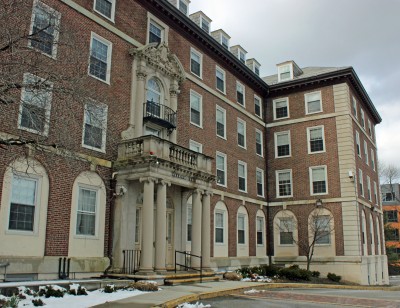
The Boston Redevelopment Authority released plans Friday to convert the Goddard House Assisted Living in Jamaica Plain into an apartment complex, according to a Friday press release.
The Goddard House closed in 2012 and since then has not been altered. According to the release, the proposed renovations will include building an additional structure and creating 167 new residential units. The plan also includes new bicycle and vehicle parking, improved landscaping (learn more about this through services like FieldRoutes) and open spaces for pedestrians.
Jonathan Greeley, director of development review for the BRA, said the plan will preserve the historic building while also updating and modernizing.
“One of the things that we wanted to do in the process was to preserve as much of the original building as possible,” Greeley said. “We wanted to make sure we respect the original architecture, but there are more modern elements that are incorporated into the building exterior that represent where we are today.”
Greeley emphasized that the project will bring additional affordable housing to Boston.
“What the community cares a lot about and what we actually care a lot about too is affordable housing,” Greeley said. “The inclusionary development policy calls for 13 percent of the market-rate units to be built to be affordable and built on-site.”
Greeley said the conversion will positively impact the residents of Jamaica Plain, as well as others looking for housing options.
“Overall, we view this project as a big win for everybody involved,” Greeley said. “It’s an active reuse of this historic building. We’re getting much-needed new housing for the neighborhood. We’re getting much-needed affordable housing and new jobs, etc.”
Daniel Bluestone, a professor in Boston University’s College of Arts and Sciences, said the project would be beneficial for the Jamaica Plain neighborhood.
“Jamaica Plain is a relatively closed-in neighborhood, easily accessible to other parts of the city by public transit and bicycle, with great culture and parks and beautiful architecture,” said Bluestone, who is part of the CAS History of Art and Architecture department. “The more we can accommodate people who want to live there, the better off we are.”
Bluestone said he supports renovating older buildings and said new architecture can improve the community and economy surrounding the building.
“If we recycle our bottles, cans and newspapers, why in the world would we not think it was an excellent idea to recycle buildings?” Bluestone asked. “It saves resources, saves the embodied energy that went into building the building in the first place, emphasizes labor and good construction jobs over new materials and helps combat climate change and resources depletion.”
Marissa Valdez, 21, of Allston, talked about her own difficulty finding affordable housing.
“Finding an apartment in my price range was almost near impossible,” she said. “This could be a good thing, but I’ve heard landlords can make the price as high as they want just because there’s such a demand.”
Elise Nagle, 30, of Brighton, said housing is an important issue but expressed apprehension about converting a building that was previously a nursing home.
“My husband and I were living in Jamaica Plain for about five years, and we had a problem finding a place that wasn’t a condo and wasn’t astronomical in price,” she said. “Elder care is a big issue, and changing over something that there are very few of in the city to more condos is not favorable in my mind.”
Mike Davis, 23, of Roxbury, said he was glad to hear of new housing options.
“I know Boston has some trouble with housing options, and it’s good that we’re getting more,” he said. “I feel like Boston is also growing, so you have to keep up with that somehow.”





















































































































